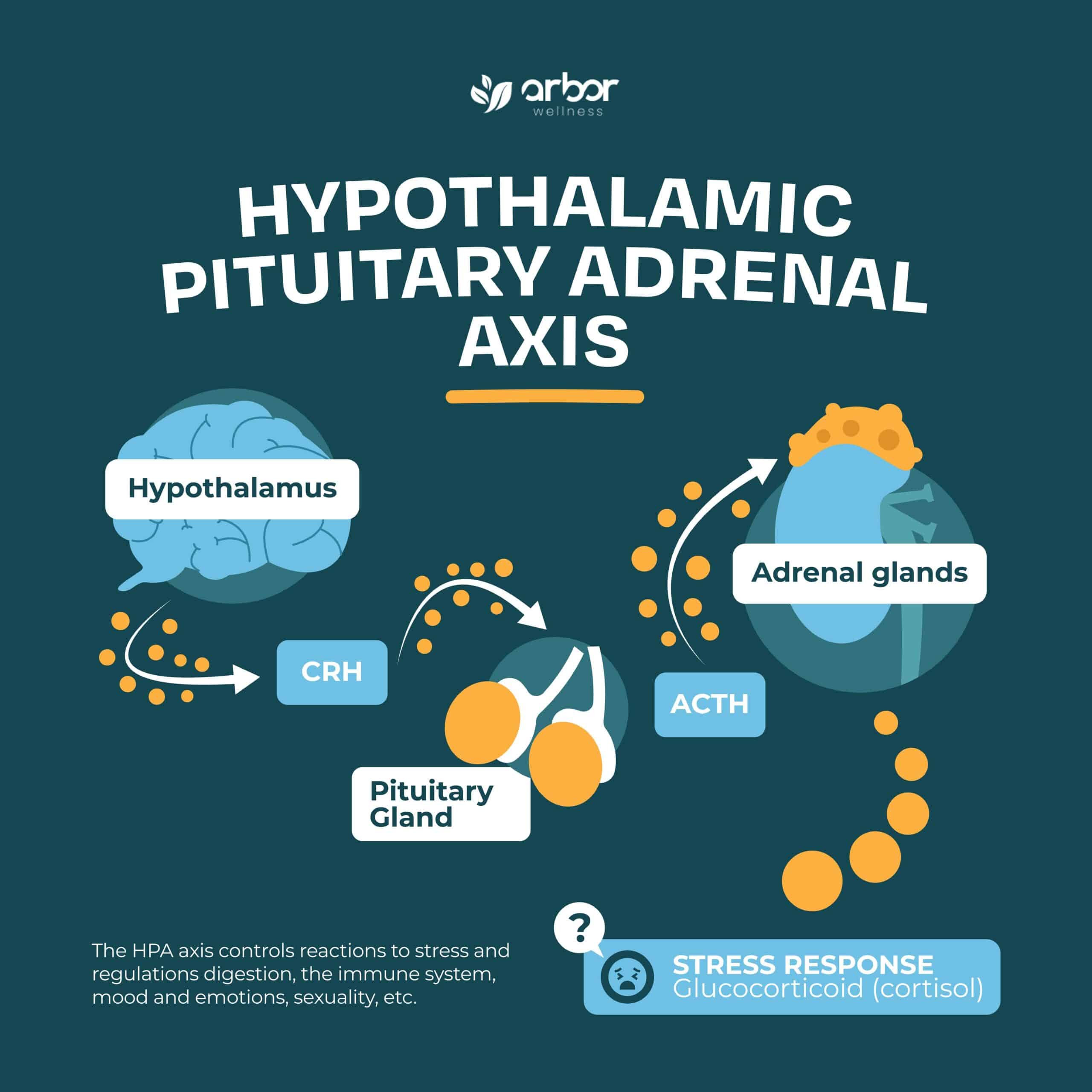Medically reviewed by Dr. Seth Thompson
Last Updated on January 4, 2025
Have you ever wondered why stress affects both your mind and body?
The answer lies in a remarkable system in your body called the HPA axis (Hypothalamic-Pituitary-Adrenal axis). Typically, the HPA axis is studied by neuroscientists, endocrinologists, and psychiatric researchers in labs and clinical settings.
However, understanding the HPA axis isn’t just for scientists – it’s valuable knowledge for anyone managing their mental health. While researchers look at brain chemistry and hormone levels, you can use this knowledge to better understand your symptoms and take control of your mental wellness.
Arbor Wellness’s mental health programs in Nashville help clients understand this instrumental part of our brains for optimal mental wellness.
What is The HPA Axis?
Think of the HPA axis as your body’s stress management command center. It’s made up of three main parts that work together:
- The hypothalamus (in your brain)
- The pituitary gland (also in your brain)
- The adrenal glands (on top of your kidneys)
These parts communicate with each other using hormones – chemical messengers that tell different parts of your body what to do. When you’re stressed, this system kicks into action, like a well-organized emergency response team.
What Is A Stress Response?
When you encounter something stressful – whether it’s a work deadline, relationship conflict, or even just a busy schedule – your HPA axis springs into action. This triggers what most people know as the “fight-or-flight” response.
Research shows this response evolved to help our ancestors survive dangerous situations, but today it responds to all types of stress, even emotional ones.
Here’s what happens in your body:
- Your brain recognizes a threat or stressor
- Your HPA axis releases stress hormones, including cortisol
- These hormones prepare your body to deal with the stress by:
- Making your heart beat faster
- Giving you more energy
- Improving your focus
- Temporarily putting less important body functions on hold
HPA Axis Dysfunction Symptoms
When chronic stress puts continuous demands on your body’s stress response system, your HPA axis can become dysregulated.
Think of it like an overworked emergency response team that’s been on call for too long – eventually, the system starts to show signs of strain. This dysregulation doesn’t happen overnight; it typically develops gradually as your body struggles to maintain balance under persistent stress.
Many people dismiss these symptoms as “just stress” or “being busy,” but recognizing them early can be crucial for preventing more serious mental and physical health issues.
Key signs that your stress response system might need attention:
Physical Signs:
- Persistent fatigue that doesn’t improve with rest
- Unexplained weight changes, particularly weight gain around the midsection
- Frequent illnesses or slow recovery from minor sicknesses
- Digestive problems that worsen during stressful periods
- Blood sugar fluctuations leading to energy crashes
- New or worsening allergies
- Increased inflammation or autoimmune symptoms
Sleep Patterns:
- Difficulty falling asleep despite feeling exhausted
- Waking up feeling unrefreshed, even after adequate sleep
- Disrupted sleep patterns, especially waking between 2-4 AM
- Daytime fatigue coupled with nighttime alertness
- Reliance on caffeine to maintain daytime functioning
Mental and Emotional Changes:
- Increased anxiety over everyday situations
- Difficulty bouncing back from emotional upsets
- Problems with memory and concentration
- Brain fog or difficulty thinking clearly
- Feeling overwhelmed by formerly manageable tasks
- Increased depression symptoms
- Heightened sensitivity to stress
Behavioral Changes:
- Strong cravings for salty or sweet foods
- Increased reliance on caffeine, sugar, or other stimulants
- Reduced stress tolerance
- Decreased motivation
- Avoiding social situations more than usual
- Changes in appetite
- Difficulty maintaining regular exercise routines
Hormonal Impacts:
- Irregular menstrual cycles in women
- Changes in sex drive
- Thyroid function changes
- Temperature regulation problems
- Increased PMS symptoms
- Changes in skin health
Energy Patterns:
- Morning fatigue and difficulty getting started
- Afternoon energy crashes
- Second wind of energy late at night
- Exercise leaving you more depleted than energized
- Inability to sustain energy throughout the day
If you recognize several of these symptoms, particularly if they’ve developed or worsened during or after a period of intense stress, your HPA axis may be dysregulated.
Remember that these symptoms can vary in intensity and combination from person to person, and you don’t need to experience all of them to have HPA axis dysfunction.
How The HPA Axis Affects Mental Health Disorders
While scientists study the HPA axis in research settings, this knowledge has practical applications for managing various mental health conditions:
- Research shows that depression often involves HPA axis changes
- Understanding this helps explain why depression affects both mood AND physical energy
- Scientists have found that anxiety disorders often involve an overactive stress response
- Knowing this helps explain physical symptoms like rapid heartbeat or sweating
PTSD:
- Researchers have discovered that trauma can alter HPA axis function
- This explains why trauma affects both emotional and physical reactions
Understanding your body’s stress response system can help you:
- Recognize when your body is under too much stress
- Understand why you might be feeling anxious or depressed
- Make better choices about managing stress
- Know when to seek help
How Do I Restore My HPA Axis Functioning & Stress Response System?
Restoring balance to your stress response system takes time and a multi-faceted approach, but it is possible.
Here’s how you can begin supporting your HPA axis recovery:
Prioritize Quality Sleep:
- Maintain a consistent sleep schedule, even on weekends
- Create a calming bedtime routine without screens
- Keep your bedroom cool, dark, and quiet
- Aim to be in bed by 10 PM when possible, as important hormonal repair happens between 10 PM and 2 AM
- Avoid caffeine after 2 PM to support natural sleep cycles
Manage Stress Mindfully:
- Practice daily relaxation techniques like deep breathing or meditation
- Set boundaries with work and personal commitments
- Learn to say “no” to non-essential demands
- Schedule regular breaks throughout your day
- Spend time in nature, which has been shown to lower stress hormones
- Consider stress-reducing activities like yoga or tai chi
Support Your Body Through Nutrition:
- Eat regular, balanced meals to stabilize blood sugar
- Include protein with each meal
- Reduce or eliminate processed foods and sugar
- Minimize caffeine and alcohol
- Stay hydrated throughout the day
- Consider foods rich in B vitamins, vitamin C, and magnesium
Exercise Appropriately:
- Start with gentle movement like walking or stretching
- Avoid high-intensity exercise until your system recovers
- Listen to your body – if exercise leaves you exhausted, scale back
- Include restorative activities like gentle yoga
- Gradually increase intensity as your energy improves
Create Daily Rhythm:
- Wake up and eat meals at consistent times
- Get morning sunlight to regulate your circadian rhythm
- Take breaks at regular intervals
- Include quiet time for rest and recovery
- Maintain a consistent evening wind-down routine
Build Emotional Support:
- Connect with understanding friends and family
- Consider working with a mental health professional
- Join support groups or communities
- Share your challenges with others who understand
- Practice self-compassion during the recovery process
Lifestyle Modifications:
- Reduce exposure to artificial light in the evening
- Create a calm home environment
- Minimize unnecessary stressors
- Use air-purifying plants or air filters
- Keep your living space organized to reduce mental clutter
Remember:
- Recovery takes time – be patient with the process
- Progress isn’t always linear
- What works for one person may not work for another
- Small, consistent changes often work better than dramatic ones
- Listen to your body’s signals
- Work with healthcare providers who understand HPA axis dysfunction
The Importance of Professional Help
While lifestyle changes can help, sometimes you need additional support. Mental health professionals understand how stress affects your body and mind, and can provide:
- Proven therapy techniques
- Personalized coping strategies
- Support in developing healthy habits
- Help processing difficult experiences
How Arbor Wellness Can Help
At Arbor Wellness, we understand the connection between stress and mental health.
Our team of experts can help you:
- Understand your personal stress patterns
- Develop effective coping strategies
- Build resilience
- Create lasting positive changes
Our treatment philosophy combines the latest research with practical, real-world solutions that work for your life. Our programs include:
Residential Treatment
Our Residential Treatment Program offers the highest level of care, providing 24/7 support in a nurturing, home-like environment. Here, you’ll receive intensive therapeutic support while living alongside others on similar healing journeys.
Our residential program combines evidence-based therapies, psychiatric care, and holistic approaches with daily structure and community support. This immersive healing environment allows you to fully focus on your recovery without the distractions and stressors of daily life.
Partial Hospitalization Program (PHP)
The Partial Hospitalization Program (PHP) serves as a step-down from residential care or an intensive first step in treatment. Meeting five days per week for six hours each day, PHP provides structured therapeutic support while allowing you to return home in the evenings.
This program offers the same comprehensive therapeutic approaches as our residential program, including individual therapy, group sessions, and psychiatric care, but with increased flexibility to begin practicing new skills in your daily life.
Intensive Outpatient Program (IOP)
Our Intensive Outpatient Program (IOP) offers flexible yet robust support for those who are ready for more independence in their recovery journey. Meeting three days per week for three hours each day, IOP allows you to maintain work, school, or family commitments while receiving vital therapeutic support. This program focuses on strengthening coping skills, building resilience, and creating sustainable strategies for long-term mental wellness, all while you navigate your regular daily responsibilities.
Begin Mental Health Treatment Today
You don’t have to face stress and mental health challenges alone. Understanding your body’s stress response is the first step toward feeling better, and we’re here to help you take the next ones.
Contact us today at 629-217-2658 to learn how we can help you build a healthier relationship with stress and improve your mental health. Our caring team in Nashville is ready to support you on your journey to wellness.









